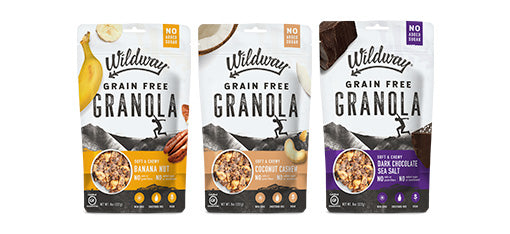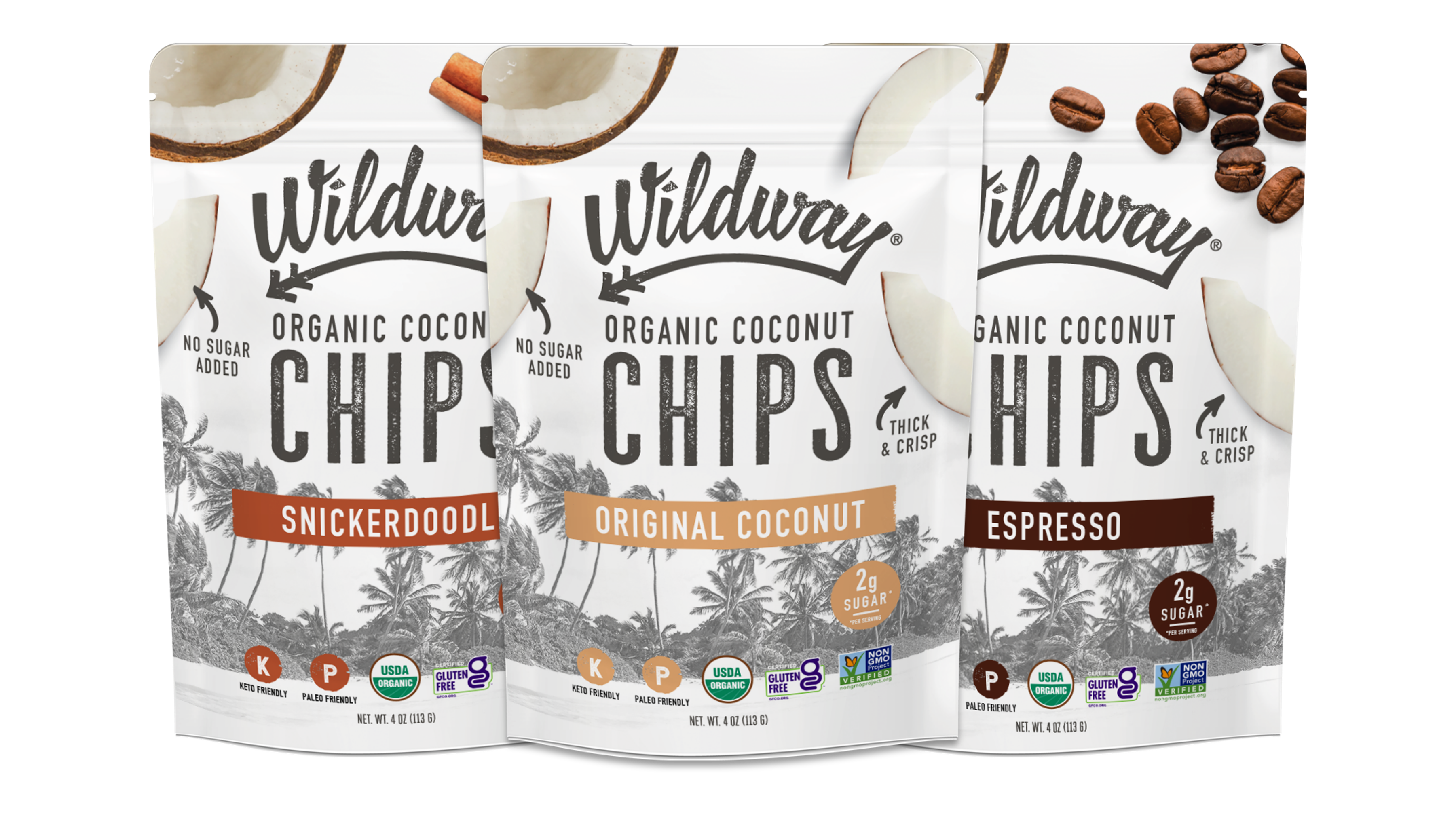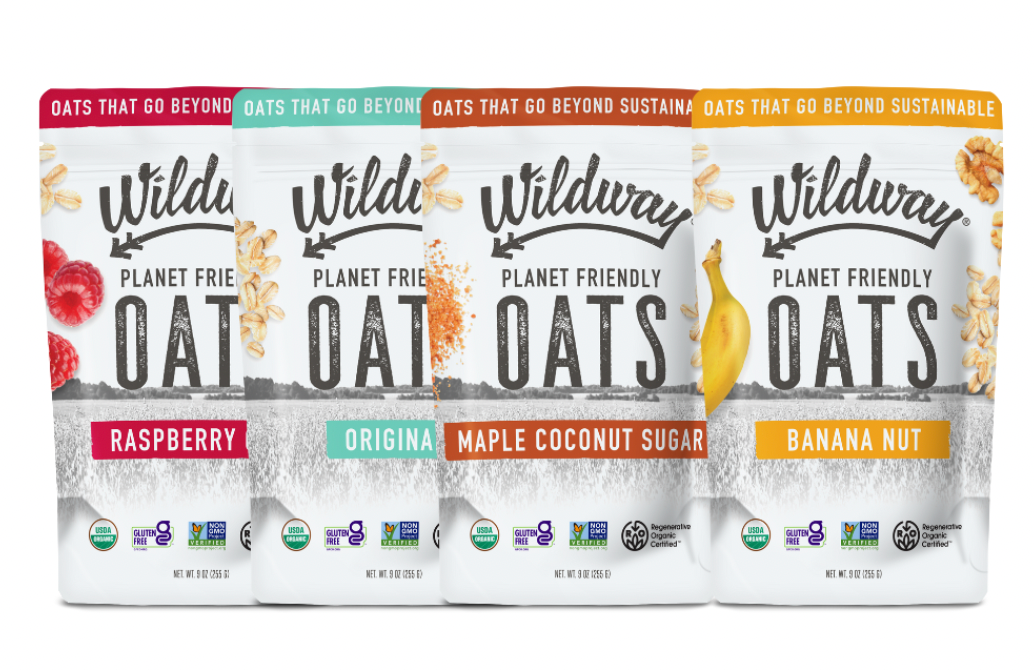Nuts, Seeds, and Fruit – Oh My!
FACT: Wildway ingredients are 100% real. They aren’t hard to pronounce. They aren’t something that was chemically engineered in a lab. They are from mother nature herself.
The sad truth about this fact is most packaged foods on the market can’t say that. There are a lot of “healthy” products out there that contain preservatives, fillers, oils, or sweeteners that can wreak havoc on our bodies. This is why we’ve created products we can confidently say will help you live a healthier life through fueling your body with ingredients you can recognize and pronounce.
The foundation of all Wildway products is nuts, seeds, and naturally dried fruit. Together, they create the perfect concoction to nourish your body and #livewild. Wildway ingredients contain a balance of micronutrients and macronutrients, which are essential for our bodies to survive and function. Before we dive into the nutritional components of nuts, seeds, and fruit, it’s important to understand the difference between macronutrients and micronutrients. Grab a bag of granola and let’s dig in…
Macronutrients
Our bodies require macronutrients in relatively large amounts to grow, develop, repair, and feel our best. There are three macronutrients1 – fats, carbohydrates, and protein. Each macronutrient has their own specific role and function in the body to supply us with energy. Nearly every food contains each macronutrient, but the ratio of each macronutrient varies. For example, the nutritional composition of an avocado2 is generally made up of 75% fat, 20% carbohydrates, and 5% protein while a banana3 consists of about 95% carbohydrates, with only small amounts of protein and fats. An avocado is clearly a more fat-based food while bananas are more carbohydrate-based. Developing an understanding of the role each macronutrient plays in the body can help guide your nutritional choices.
- Fats – Fats are an essential part of a healthy diet. They help by improving brain development, overall cell function, protecting the body’s organs and even helping to absorb vitamins found in foods. Examples of some healthy fats include almonds, walnuts, seeds, olives, and avocados.
- Carbohydrates – Carbohydrates are comprised of small chains of sugar which the digestive body breaks down into glucose to use as the body’s primary energy source. Examples of carbohydrates include apples, bananas, dates, cauliflower, and root veggies.
- Protein – Protein is essential for repairing and regenerating body tissues and cells, a healthy functioning immune system and manufacturing hormones. This wouldn’t be possible without amino acids, which are found in protein-based foods. There are 20 types of amino acids, 9 of which are “essential” and can only be found in certain foods. Sources of protein include seeds, nuts, fish, poultry, beef, and raw greens such as kale and spinach.
Wildway Takeaway: The three macronutrients are fats, carbohydrates and protein. Each macronutrient serves different purposes, but together they provide our bodies the ability to grow, develop, and repair.
Micronutrients
Micronutrients1 are equally as important as macronutrients but are needed in smaller quantities. Micronutrients depend on macronutrients to keep the body functioning and are crucial in order to maintain energy levels, metabolism, cellular function, and physical and mental wellbeing. The term micronutrient is used to describe vitamins and minerals. We, as humans, must obtain micronutrients from food since our bodies cannot produce vitamins and minerals. Micronutrients can be divided into four categories: water soluble vitamins, fat-soluble vitamins, macrominerals and trace minerals.
- Water-Soluble Vitamins – These vitamins dissolve in water but are not easily stored in your body and get flushed out with urine when consumed in excess. Each water-soluble vitamin has a unique role. For example, most B vitamins act as coenzymes to trigger chemical reactions related to energy production. Symptoms of a B vitamin deficiency include lack of energy or fatigue.
- Fat-Soluble Vitamins – Fat-soluble vitamins are most abundant in high-fat foods and are much better absorbed into your bloodstream when you eat them with fat. There are four fat-soluble vitamins, including Vitamin A, D, E, and K.
- Macrominerals – These minerals include calcium, phosphorous, magnesium, sodium, potassium, chloride, and sulfur. Macrominerals are needed in larger amounts than trace minerals.
- Trace Minerals – These minerals include iron, manganese, copper, iodine, zinc, cobalt, fluoride, and selenium. Trace minerals are needed in very small amounts.
Wildway Takeaway: There are four types of micronutrients – water-soluble vitamins, fat-soluble vitamins, macrominerals, and trace minerals. Micronutrients are needed in smaller quantities than macronutrients but are just as important in keeping the body functioning and are crucial for maintaining energy levels, metabolism, cellular function, and physical and mental wellbeing.
Now that we’ve drained that bag of granola and have a solid understanding of macro- and micronutrients, grab a snack mix and let’s dive into the nutritional benefits of the 100% real-food ingredients that build the foundation of each Wildway of Life product: nuts, seeds, and dried fruit.
Nuts
Nuts are high in two macronutrients, fat and protein. They are also high in fiber and contain significant amounts of essential micronutrients. Nuts typically receive a bad rap for their high calorie and fat content, but when consumed in moderation, nuts can lead to good health. They are nutrient rich foods with wide-ranging cardiovascular and metabolic benefits. Recent research4 has determined that certain fats common in nuts, including unsaturated and omega-3 fatty acids, reduce the risk of cardiovascular disease. Some additional nutritional benefits of incorporating nuts in your diet are included below:
- Leave you satiated – Nuts are rich in fat, protein, and fiber, which are likely to keep you fuller than foods high in carbohydrates. Contrary to popular belief, epidemiologic studies and clinical trials suggest that regular nut consumption is unlikely to contribute to obesity and may even help in weight loss5.
- Balance cholesterol levels – The unsaturated fats in nuts help lower the bad cholesterol, LDL, and raise the good cholesterol, HDL.
- Reduce blood clotting – There is evidence that omega-3 fatty acids may work similar to aspirin in preventing blood from clotting.
- Contribute to heart health – Omega-3 fatty acids in nuts may help prevent the development of erratic heart rhythms.
- Control glucose levels – Nuts can raise levels of glucagon-like peptide 1, which is a hormone that helps to control glucose levels to lower insulin levels in people with prediabetes.
In an effort to capture all of these wonderful benefits nuts have to offer, we replaced oats and other grains typically used in granola with nuts. Each of our Wildway products incorporate walnuts, pecans, or cashews into every bite.
Wildway Takeaway: Nuts are a nutrient-dense food that provide a variety of nutritional benefits. Don’t be afraid of their high fat content, as the unsaturated fat in nuts has been shown to lower the bad type of cholesterol and increase the good type of cholesterol.
Seeds
Nutritionally speaking, most nuts and seeds generally contain many of the same nutrients and health benefits, including protein, vitamins, minerals, healthy fats, and fiber. However, every nut and seed provide us varying levels of macro- and micronutrients. To ensure we’re all getting variety in our diets, Wildway products include a variety of nuts, as well as pumpkin seeds and sunflower seeds.
- Pumpkin seeds – Pumpkin seeds are high in antioxidants like carotenoids and vitamin E, which help reduce inflammation and protect our cells from harmful free radicals. In one study6, pumpkin seed oil reduced inflammation in rats with arthritis without side effects, whereas animals given an anti-inflammatory drug experienced adverse effects. We’re all about using food as medicine, which is why pumpkin seeds are included in all our Wildway granolas and snack packs.
- Sunflower seeds – Sunflower seeds may be small, but they pack a lot of nutrients. They are rich in the B complex vitamins, which are essential for a healthy nervous system, and are a good source of minerals including magnesium, iron, and zinc. Sunflower seeds are exceptionally high in vitamin E and selenium, which are also powerful antioxidants that help prevent chronic disease.
Some other examples of power-house seeds to consider incorporating into your diet include:
- Flaxseeds – Try incorporating flax meal or flax seeds into your morning smoothie. They also work great as a vegan egg replacer in baked goods.
- Chia seeds – Ever tried chia seed pudding? It’s a great alternative to overnight oats, as they can be prepped the night before. Top with some Wildway granola and voila, you have a nutrient dense breakfast to-go!
- Hemp seeds – Hemp seeds are a great source of protein. They contain more than 30% protein and are considered a complete protein source. Making homemade hemp milk is easy and only requires water and a high-speed blender.
- Sesame seeds – Did you know tahini is just ground up sesame seeds? Tahini mixed with lemon juice, some spices, and water to thin makes an excellent homemade salad dressing.
Wildway Takeaway: Seeds provide similar nutritional benefits as nuts but provide us with further variety of vital micronutrients. Seeds have anti-inflammatory properties that have been shown to help prevent chronic disease.
Dried Fruit
Fruit is a hot topic among the health and wellness community lately. With keto and low carb diets hitting the headlines, fruit is given a lot of flak. Is fruit too high in carbohydrates? Does fruit have too much sugar in it? Will fruit make me fat? The short answer is no - fruit is not bad for you - especially when incorporated in moderation.
The sugar in fruit is from glucose and fructose7. Fructose is naturally occurring in fruits and things like cane sugar or honey. Glucose is also naturally occurring, but is a byproduct of photosynthesis. Our bodies burn glucose for energy or convert it to fat to store in your fat cells. Our bodies need stored energy, so don’t be afraid of the thought of some excess glucose. Think of it like fueling your car with gas. Would you drive around with an empty tank all the time, only to have to stop at a gas station every mile? That just sounds inefficient, and well, exhausting. Our bodies are really good at maintaining balance on their own when given proper fuel and nutrients.
Something else to keep in mind is fruit’s high fiber content8. When you consume fruit, you are consuming fiber, vitamins, minerals, and sugar. In general, due to fruit’s high fiber content, it will cause less of a blood sugar spike compared to table sugar or ingredients such as high fructose corn syrup. It’s important to be aware of natural sugars verses added sugars when looking at ingredient labels. Fruit has a similar level of sugar content and provides a similar level of sweetness as added sugar, but it provides far more nutritional benefits9. This is why Wildway products use dried fruit to sweeten our products instead of refined sugar, syrups, or even honey. All the fruit in our products is naturally dehydrated and dried without any added sugars, oils, or sulfites. This can be hard to source, but we’re so passionate about our health, and our customer’s health, that we always want to give our bodies what they deserve – which is 100% real food.
Wildway Takeaway: Fruit is high in beneficial fiber and the dried fruit in all Wildway products is free of added sugar, oils, and sulfites. The naturally occurring sugar in fruits help provide our bodies fuel to burn for energy.
Wildway products contain a balance of nuts, seeds, and dried fruit. Each ingredient provides our bodies with both macronutrients and micronutrients. Some micronutrients in fruit are fat-soluble so our bodies rely on fat sources, such as nuts or seeds, to absorb those vitamins and minerals. Through incorporating a variety of food sources in our diets, we can provide our bodies the fuel they need to store and create energy.
Wildway Takeaway: Make sure you’re consuming enough protein, fats, and carbohydrates to feel your best. Consuming a variety of foods is a great way to ensure we’re getting all the vitamins and minerals we need to support our bodies. Nuts, seeds, and dried fruits, are the perfect combination of macro- and micronutrients.
REFERENCES:
1 https://mynutrition.wsu.edu/nutrition-basics
2 https://www.ncbi.nlm.nih.gov/pmc/articles/PMC3664913/
3 https://www.hsph.harvard.edu/nutritionsource/food-features/bananas/
4 https://www.health.harvard.edu/nutrition/why-nutritionists-are-crazy-about-nuts
5 https://www.ncbi.nlm.nih.gov/pmc/articles/PMC3257681/
6 https://www.ncbi.nlm.nih.gov/pubmed/7784309
7 https://www.healthline.com/nutrition/sucrose-glucose-fructose
8 https://www.health.harvard.edu/healthy-eating/is-eating-dried-fruit-healthy
9 https://well.blogs.nytimes.com/2013/07/31/making-the-case-for-eating-fruit








